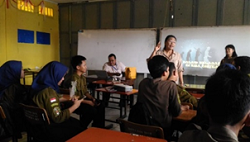Meningkatkan School Well-Being di Era Digital (Pengabdian Masyarakat di SMA Muhammadiyah 1 Jakarta) Improving School Well-Being in the Digital Age (Community Service at SMA Muhammadiyah 1 Jakarta)
Main Article Content
Abstract
Students' perceptions of the school environment need attention because they can indirectly affect students' efforts to achieve academic achievement. Therefore, schools always strive to create safe, comfortable, fun, and not dull conditions, known as school well-being, which is the development of the concept of well-being. This community service activity was carried out for class X IIS 2 SMA Muhammadiyah 1 Jakarta, who felt less happy because they could not follow lessons using information technology in their teaching and learning activities. This community service aims to improve students' school well-being so that with the happiness they feel, students are more enthusiastic and motivated to improve their learning achievement at school. This activity is carried out in the form of counseling. The results obtained from this activity are an increase in students' understanding of school well-being and creating a sense of happiness in the teaching and learning process.
Downloads
Article Details
Authors who publish with this journal agree to the following terms:
- Any article on the copyright is retained by the author(s).
- Author grant the journal, right of first publication with the work simultaneously licensed under a Creative Commons Attribution License that allows others to share work with acknowledgment of the work authors and initial publications in this journal.
- Authors are able to enter into a separate, additional contractual arrangements for non-exclusive distribution of published articles of work (eg, post-institutional repository) or publish it in a book, with acknowledgment of its initial publication in this journal.
- Authors are permitted and encouraged to post their work online (e.g., in institutional repositories or on their websites) prior to and during the submission process, as can lead to productive exchanges, as well as earlier and greater citation of published work.
- The article and any associated published material is distributed under the Creative Commons Attribution-ShareAlike 4.0 International License
References
Azhari, Situmorang, N.Z. 2019. Dampak Positif School well-being pada Siswa di Sekolah. Prosiding Seminar Nasional Magister Psikologi Universitas Ahmad Dahlan. 256-262.
Dariyo, A. 2017. Peran School Well Being dan Keterlibatan Akademik dengan Prestasi Belajar pada Siswa Sekolah Dasar. Jurnal Psikogenesis. 5(1):1-9. https://doi.org/10.24854/jps.v5i1.490
Faizah, Prinanda, J.N., Rahma, U., Dara, Y.P. 2018. School Well-Being pada Siswa Berprestasi Sekolah Dasar yang Melaksanakan Program Penguatan Pendidikan Karakter. Psympathic : Jurnal Ilmiah Psikologi. 5(2):161-174. https://doi.org/10.15575/psy.v5i2.3313
Keyes, C.L.M., Waterman, M.B. 2008. Dimensions of Well-Being and Mental Healt in Adulthood. Dalam March H. Bornstein, dkk. (Ed), Well-Being: Porsitive Development Across the Life Course. New Jersey: Lanrence Erlbaum Associates, Inc.
Khairunnisa, P.A. 2018. Pengaruh School well-being terhadap Student Engagement pada Siswa SMA WR Supratman 2 Medan. Skripsi. Medan: Universitas Sumatera Utara.
Konu, A.I., Rimpela, M.K. 2002. Well-being in Schools: A Conceptual Model. Health Promotion International. 17(1):79-87. https://doi.org/10.1093/heapro/17.1.79
Konu, A.I., Lintonen, T.P., Rimpela, M.K. 2002. Factors Associated with Schoolchildren’s General Subjective Well-being. Health Education Reseacrh. 17(2):155-165. https://doi.org/10.1093/her/17.2.155
Kristiawan, M., Safitri, D., Lestari, R. 2017. Manajemen Pendidikan. Yogyakarta: Deepublish Publisher.
Muliani, A., Royanto, L.R.M., Udaranti, W.S. 2012. Hubungan antara School Well Being dan Keterlibatan dalam Kegiatan Belajar pada Siswa SMA Kelas 11. Manasa: Jurnal Ilmiah Psikologi. 1(1):100-107.
Veenhoven, R. 1991. Questions on happiness: classical topics, modern answers, blind spots. In Strack, F., Argyle, M., Schwarz, N. (eds), Subjective Well-being. An Interdisciplinary Perspective. Oxford: Pergamon Press. 7–26.
Warif, M. 2019. Strategi Guru Kelas dalam Menghadapi Peserta Didik yang Malas Belajar. Tarbawi : Jurnal Pendidikan Agama Islam. 4(1):38-55. https://doi.org/10.26618/jtw.v4i01.2130
